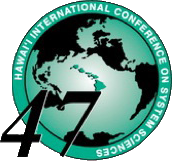Social Media & Social Networking AnD Government Minitrack

Co-chairs
Suha AlAwadhi (Primary Contact)
Department of Library & Information Science
College of Social Sciences
Kuwait University
P.O. Box 68168, Kaifan 71962, Kuwait
Phone: +965-2-498-4845
Fax: +965-2-484-0718
E-mail: s.alawadhi@ku.edu.kw
Jay P. Kesan
College of Law
University of Illinois at Urbana Champaign
504 E. Pennsylvania Ave. Champaign, Ill 61820, USA
Phone +1-217-333-7887
Email: kesan@illinois.edu
Marko M. Skoric
Wee Kim Wee School of Communication and Information
Nanyang Technological University
31 Nanyang Link
Singapore 637718
Phone: +65-6316-8893
Email: marko@ntu.edu.sg




Social media and networks have received a lot of attention in the last decade. Sites such as Facebook, Twitter, and LinkedIn provide a mechanism for individuals to come together based on a variety of factors such as existing friendships, common interests, work or political interests. People have discovered how the use of social networks can facilitate communication and interaction. As a result, new ways of communication have been established in society. Social media increase the opportunities for individual users to share digitally created content and ideas. YouTube, Blogs, and Flicker are platforms that are easy to use and provide interfaces for other social media and networks. Consequently, digital resources become interconnected by users who view, provide and share web content; related legal issues are still part of an ongoing discussion. Recently, the role of the Internet for social movements, in particular Middle Eastern affairs and the Arab Spring, has been discussed, where activists and bloggers use interactive media and social networks to influence events on the ground.
Governments have also discovered the potential of social media sites for sharing governmental information and outreach. New means of communication can facilitate increased participation and collaboration within society. Social media unite several communication channels and enhance opportunities for citizens to provide feedback to government officers and political representatives. Guidelines for the use of social media and social networks are relatively new in governmental agencies. What might be suitable for one agency might not be adequate for another one. Many citizens already appreciate the comfort of the Internet communication and the demand for easy and fast web services is growing. At the same time, issues related to privacy, information leakage, blurred boundaries and online addiction must be addressed when discussing social media.
This minitrack is open to papers that cover all aspects of social networking, especially in the context of electronic government.
Topics and research areas include, but are not limited to:
-
•Case studies of the use of social media and networks by any level of government
-
•Usage of social media and networks for participation and collaboration
-
•Links between social media use and offline political/civic action
-
•Implementation challenges
-
•Maintaining privacy in social media and networks
-
•Patterns and trends in social networking
-
•Social media and networks for information sharing
-
•Leakage of organizational information through social networks
-
•Trust and information credibility in social networks
-
•Security of user information and broader computer security challenges
-
•Social networks and ‘information overload’
-
•Mobile social networking
-
•Guidelines and policies for social media and networks
-
•Legal concerns when providing and sharing content via social media
-
•Web identities of civil servants
-
•Potentials of social media and networks
-
•Forecasting and prognosis by social media and networks
-
•
More co-chair information
Suha AlAwadhi, PhD, is an Assistant Professor, Department of Library and Information Science, College of Social Sciences, Kuwait University. She is also an Affiliate Assistant Professor the Information School, University of Washington. She is a member of DGSNA and IFIP E-government Conference (EGOV). Dr. AlAwadhi has participated in many conferences such as HICSS, EGOV, IFLA, and CeDEM12. Her research areas of interest include e-government, knowledge management, social inclusion, knowledge sharing and social networking.
Jay P. Kesan, PhD, is Professor & H. Ross and Helen Workman Research Scholar and Director of the Program in Intellectual Property & Technology Law at the University of Illinois. His academic interests and writings are in the areas of digital government, cyberlaw, patent law, entrepreneurship, and law and technology. He is a registered patent attorney and received his J.D. summa cum laude from Georgetown University. He also has a Ph.D. in Electrical and Computer Engineering from the University of Texas at Austin and worked for several years as a research scientist at the IBM T.J. Watson Research Center in New York. For a more complete bio, please see http://www.jaykesan.com
Marko M. Skoric, PhD, is Assistant Professor at the Wee Kim Wee School of Communication and Information, Nanyang Technological University, Singapore. He holds a Ph.D. in Communication from the University of Michigan, and a B.Sc. in Psychology from the University College London. Dr. Skoric’s teaching and research interests are focused on new media and social change, with particular emphasis on civic and political implications of new communication technologies. His work has appeared in the leading journals in the field of new media, including Journal of Computer-Mediated Communication, CyberPsychology, Behavior, and Social Networking, and Computers in Human Behavior and his research has been presented at conferences such as HICSS, ICA, CeDEM and ICWSM. For more information, please visit http://www.markoskoric.com

“Social media provide a new dimension to the interactions between citizens and government ”






